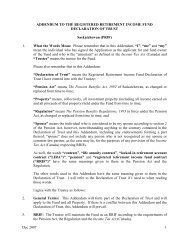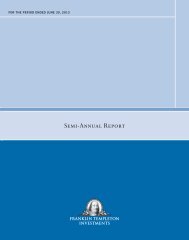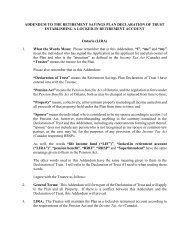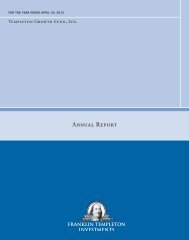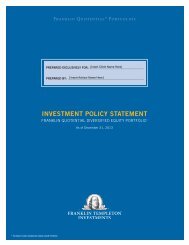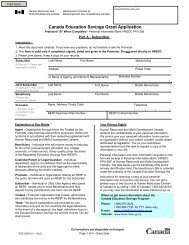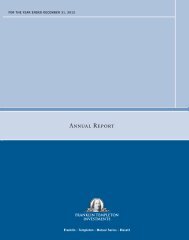Korea; the Commission de Surveillance du Secteur Financier in Luxembourg; the Malaysian SecuritiesCommission; the Comision Nacional Bancaria y de Valores in Mexico; the Autoriteit Financiële Markten inThe Netherlands; the Polish Securities and Exchange Commission; the Monetary Authority of Singapore;the Comisión Nacional del Mercado de Valores in Spain; the Finansinspektionen in Sweden; the SwissFederal Banking Commission; the Taiwan Securities and Futures Bureau, the Ministry of Finance and theCommerce Department, Ministry of Economic Affairs in Taiwan; the Dubai Financial Services Authority inthe United Arab Emirates; the Financial Services Authority in the United Kingdom; and the State SecuritiesCommission of Vietnam.The Advisers Act imposes numerous obligations on certain of our subsidiaries registered with the SECas investment advisers, including record keeping, operating and marketing requirements, disclosureobligations and prohibitions on fraudulent activities. The Investment Company Act imposes similarobligations on the investment companies that are advised by our subsidiaries. The SEC is authorized toinstitute proceedings and impose sanctions for violations of the Advisers Act and the Investment CompanyAct, ranging from fines and censure to termination of an investment adviser’s registration.The Company and many of the investment companies advised by our various subsidiaries are subjectto federal securities laws and state securities and corporate laws, including those affecting corporategovernance, such as the Sarbanes-Oxley Act of 2002 and rules adopted by the SEC. As a NYSE-listedcompany, we are also subject to the rules of the NYSE, including its corporate governance standards. Thefederal securities laws have also been augmented by other measures, including the USA Patriot Act of 2001.FINRA Conduct Rules limit the amount of aggregate sales charges that may be paid in connection withthe purchase and holding of investment company shares sold through broker/dealers. The effect of the ruleis to limit the amount of fees that could be paid pursuant to a fund’s Rule 12b-1 Plan to FTDI, our principalunderwriting and distribution subsidiary in the United States, which earns underwriting commissions on thedistribution of fund shares in the United States.Following the acquisition of Fiduciary Trust in April 2001, Franklin registered as a bank holdingcompany under the BHC Act and became subject to supervision, regulation and examination by the FRB.Franklin also elected to become a financial holding company in 2001. Under FRB policy, a bank holdingcompany, including a financial holding company, is expected to act as a source of financial strength to eachof its banking subsidiaries. In addition, bank holding companies should pay cash dividends on commonstock only out of income available from the previous fiscal year and only if prospective earnings retention isconsistent with anticipated future needs and financial condition.The FRB also has adopted a system of risk-based capital guidelines to evaluate the capital adequacy ofmost bank holding companies, including Franklin. Under these guidelines, Franklin and our bankingsubsidiaries must meet specific capital adequacy requirements that involve quantitative measures of our assets,liabilities and certain off-balance sheet items as calculated under regulatory accounting practices. To beconsidered “well capitalized” under the FRB capital guidelines, a bank holding company or bank mustmaintain a minimum Tier 1 leverage ratio of five percent, a minimum Tier 1 risk-based capital ratio of sixpercent and a minimum total risk-based capital ratio of ten percent. As of September 30, 2009, our Tier 1leverage, Tier 1 risk-based capital and total risk-based capital ratios were 75%, 97% and 97%. In addition,both Fiduciary Trust and FTB&T were well capitalized as of September 30, 2009. A depository institutiongenerally is prohibited from making capital distributions, including paying dividends, or paying managementfees to a holding company if the institution would thereafter be undercapitalized. Moreover, undercapitalizedinstitutions may not accept, renew or roll over brokered deposits. Bank regulators are required to take promptcorrective action to resolve any problems associated with insured depository institutions, such as FiduciaryTrust and FTB&T, if they become undercapitalized. The GLB Act, however, generally prohibits the FRB fromimposing similar capital requirements on regulated non-bank subsidiaries of a financial holding company.20
Pursuant to the GLB Act, a bank holding company may elect to become a financial holding companyto engage in a broader range of activities that are financial in nature, including securities underwriting,dealing and market making, securitizing assets, sponsoring mutual funds and investment companies,engaging in insurance underwriting and brokerage activities and investing (without providing routinemanagement) in companies engaged in non-financial activities. To qualify as a financial holding company,each of a bank holding company’s U.S. subsidiary banks and other depository institution subsidiaries, whichare not subject to an exemption, must be and remain at all times well capitalized and well managed. Inaddition, each such subsidiary must have achieved at least a “satisfactory” rating under the CommunityReinvestment Act (“CRA”) in the evaluation preceding the financial holding company election. WhileFTB&T is subject to CRA requirements, Fiduciary Trust remains exempt from such requirements because itqualifies as a special purpose bank. If, however, we do not continue to meet all of the requirements forstatus as a financial holding company, we would, depending on which requirement is not met, be required to(i) cause Fiduciary Trust or FTB&T to meet such requirement and, in the meantime, seek prior FRBapproval to undertake certain new activities or certain banking and non-banking acquisitions, or (ii) eitherdiscontinue our banking (but not our thrift) business, or discontinue those activities not generallypermissible for bank holding companies.The BHC Act generally requires that a bank holding company obtain prior approval of the FRB beforeacquiring control of any bank. In addition, the FRB may impose limitations, restrictions, or prohibitions onthe activities or acquisitions of a financial holding company if the FRB believes that the financial holdingcompany does not have appropriate financial and managerial resources. The GLB Act establishes the FRBas the umbrella supervisor for financial holding companies and adopts an administrative approach toregulation that generally requires the FRB to defer to the actions and requirements of the U.S. “functional”regulators of subsidiary broker/dealers, investment advisers, investment companies, insurance companies,and other regulated non-depository institutions. The FRB, however, retains broad authority to prohibitactivities of bank holding companies and their non-banking subsidiaries that represent unsafe and unsoundbanking practices or that constitute violations of law or regulation. Civil money penalties may be imposedfor certain activities conducted on a knowing or reckless basis if those activities cause a substantial loss tothe bank holding company.Each of our banking subsidiaries is subject to restrictions under federal law that limit transactions withFranklin and its non-bank subsidiaries, including loans and other extensions of credit, investments, or assetpurchases. These and various other transactions, including any payment of money to Franklin and itsnon-bank subsidiaries, must be on terms and conditions that are, or in good faith would be, offered tocompanies that are not affiliated with these entities. In addition, these laws and related regulations may limitthe Company’s ability to obtain funds from subsidiary banks or affiliates.The operations and activities of Fiduciary Trust are subject to extensive regulation, supervision andexamination by the FDIC and NYSBD while the operations and activities of our other subsidiaries,including FTB&T, are subject to oversight by the OTS and various state regulators. The laws andregulations of these regulators generally impose restrictions and requirements, with which we must comply,on capital adequacy, anti-money laundering, management practices, liquidity, branching, earnings, loans,dividends, investments, reserves against deposits and the provision of services.The federal banking agencies and the NYSBD have broad enforcement powers, including the power toterminate deposit insurance, impose substantial fines and other civil and criminal penalties and appoint aconservator or receiver. Failure to comply with applicable laws, regulations and supervisory agreements couldsubject Franklin, our thrift and banking subsidiaries, as well as officers, directors and other so-called“institution-affiliated parties” of these organizations to administrative sanctions and potentially substantial civilmoney penalties. In addition, the appropriate federal banking agency may appoint the FDIC as conservator orreceiver for a banking institution, or the FDIC may appoint itself if certain circumstances exist.21
- Page 1 and 2: G A I N F R O M O U R P E R S P E C
- Page 3 and 4: Letter to StockholdersGregory E. Jo
- Page 5 and 6: LETTER TO STOCKHOLDERSHaving announ
- Page 7 and 8: Directors and OfficersDirectorsChar
- Page 9 and 10: Performance GraphThe following perf
- Page 11 and 12: (MARK ONE)UNITED STATESSECURITIES A
- Page 14 and 15: operational and other services requ
- Page 16 and 17: A. Assets Under Management (“AUM
- Page 18 and 19: 60 days. If agreements representing
- Page 20 and 21: Similar arrangements exist with the
- Page 22 and 23: We generally operate our institutio
- Page 24 and 25: Franklin Templeton Variable Insuran
- Page 26 and 27: CATEGORY(and approximate amount of
- Page 28 and 29: The following table sets forth the
- Page 32 and 33: COMPETITIONThe financial services i
- Page 34 and 35: or other efforts successfully stabi
- Page 36 and 37: and, consequently, we are incurring
- Page 38 and 39: such as information, systems and te
- Page 40 and 41: like our business, is based in part
- Page 42 and 43: orrowing costs and limit our access
- Page 44 and 45: director of various subsidiaries of
- Page 46 and 47: PART IIItem 5. Market for Registran
- Page 48 and 49: OverviewWe are a global investment
- Page 50 and 51: Net income decreased in fiscal year
- Page 52 and 53: Investment Management Fee RateThe f
- Page 54 and 55: accounts closed in a calendar year
- Page 56 and 57: Information Systems, Technology and
- Page 58 and 59: Our investments in sponsored invest
- Page 60 and 61: At September 30, 2009, we had $355.
- Page 62 and 63: Off-Balance Sheet ArrangementsAs of
- Page 64 and 65: The fair value of retained subordin
- Page 66 and 67: Indefinite-lived intangible assets
- Page 68 and 69: the position will be sustained upon
- Page 70 and 71: Selected Quarterly Financial Data (
- Page 72 and 73: The following is a summary of the e
- Page 74 and 75: Item 8.Financial Statements and Sup
- Page 76 and 77: REPORT OF INDEPENDENT REGISTERED PU
- Page 78 and 79: CONSOLIDATED BALANCE SHEETS(dollars
- Page 80 and 81:
CONSOLIDATED STATEMENTS OF STOCKHOL
- Page 82 and 83:
CONSOLIDATED STATEMENTS OF CASH FLO
- Page 84 and 85:
Fair Value Measurements. The Compan
- Page 86 and 87:
Company held interest-rate swap agr
- Page 88 and 89:
not performed. If the carrying valu
- Page 90 and 91:
Accumulated Other Comprehensive Inc
- Page 92 and 93:
acquisition cost was allocated to t
- Page 94 and 95:
FHLB borrowings and amounts availab
- Page 96 and 97:
The Company recognized other-than-t
- Page 98 and 99:
The changes in Level 3 assets measu
- Page 100 and 101:
Changes in the allowance for loan l
- Page 102 and 103:
Company sold retained subordinated
- Page 104 and 105:
Certain of the goodwill and intangi
- Page 106 and 107:
At September 30, 2009, maturities o
- Page 108 and 109:
The components of the net deferred
- Page 110 and 111:
At September 30, 2009, the banking/
- Page 112 and 113:
Total assets under management of in
- Page 114 and 115:
Stock OptionsThe following table su
- Page 116 and 117:
The following tables summarize info
- Page 118 and 119:
Operating revenues of the banking/f
- Page 120 and 121:
minimum Tier 1 and Total risk-based
- Page 122 and 123:
PART IIIItem 10. Directors, Executi
- Page 124 and 125:
Item 15.(a)(1)(a)(2)(a)(3)PART IVEx
- Page 126 and 127:
Exhibit No.Description10.17 Represe
- Page 128 and 129:
Exhibit No.Description12 Computatio
- Page 130 and 131:
Exhibit No.DescriptionEXHIBIT INDEX
- Page 132 and 133:
Exhibit No.Description10.22 Amendme
- Page 134 and 135:
(dollars in thousands)COMPUTATION O
- Page 136 and 137:
NameState or Nation ofIncorporation
- Page 138 and 139:
CONSENT OF INDEPENDENT REGISTERED P
- Page 140 and 141:
EXHIBIT 31.2CERTIFICATIONI, Kenneth
- Page 142 and 143:
CERTIFICATION PURSUANT TO 18 U.S.C.
- Page 144:
One Franklin ParkwaySan Mateo, CA 9



